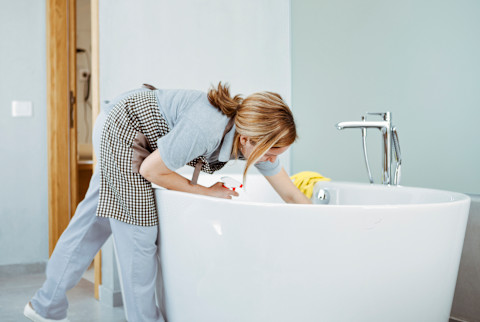Think You Could Have Mold In Your Home? Watch Out For These 3 Sneaky Signs

Mold can be tricky to spot and even trickier to treat, especially when it's in places you don't think to look, according to functional medicine doctor Kenneth Bock, M.D. On a recent episode of the mindbodygreen podcast, Bock called out three sneaky signs you could have mold in your home, plus gave tips on how to treat it quickly.
3 signs of mold:
Unexplained symptoms
Bock (and other mold experts) say that mold can lead to a variety of symptoms that tests can't explain, such as dizziness, lightheadedness, brain fog, and rashes. Bock adds that mold can also exacerbate existing respiratory issues like asthma and allergies.
"There's lots of stuff you can get from mold that's unexplained, and when other [tests] are done, they don't find them," he says.
Inconspicuous leaks
If you've had leaks in your home recently, that's a clue that mold may have formed, Bock says. So you'll want to check for mold anywhere water has passed through, from your basement to your bathroom. Even condensation around windows can lead to mold growing around windowsills.
"Some people know that they've had leaks but never think about mold," Bock notes, adding that things like damp basements are also a common culprit.
A funky smell
Last but not least, yes, mold can smell—though you may not notice it depending on where it is or how much there is of it. "Some people smell mold, but don't even think that it can affect them," Bock tells mbg. Mold is often described as musty or earthy, and some compare it to the smell of rotting wood or sweaty socks. (Pleasant, we know.)
What to do about it.
First things first, if you spot a small patch of mold, you'll want to treat it right away. As long as it's on a hard, nonporous surface, you should be able to clean it yourself using a special mold removing cleaner like this one, previously recommended to mbg by mold expert Michael Rubino. (Check out our full guide to cleaning and preventing mold for more info.)
If you only suspect that you have mold, but you're not sure where, Bock says you'll want to call in professional mold inspectors to take a closer look. "Usually you want a mold inspector who doesn't do the remediation," he notes, adding that it's unfortunately "not cheap."
From there, the inspectors can determine whether you need to go all out on mold remediation. In the meantime, you can also consider getting an air purifier to help with overall air quality.
The bottom line.
Our homes are meant to be our havens, not make us sick—and mold is certainly not ideal for a healthy home environment. If you think there could be mold in your home—either because of mysterious symptoms, water damage, or funky smells—don't wait to take care of it.
